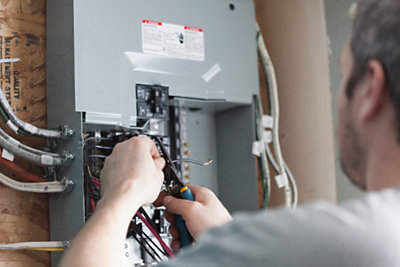Upgrading Your Home’s Electrical Panel : A Complete Guide
Is your electrical panel fit for your home's power needs? Upgrading your electrical setup is more than a modern convenience—it’s about safety, efficiency, and meeting the demands of a modern home. From recognizing the signs that it’s time for an electrical panel upgrade to understanding the financial aspect, this guide walks you through everything about electrical panel upgrades without overwhelming you with technical jargon.
Key Takeaways
Electrical panel upgrades enhance home safety, efficiency and can increase resale value, but require consideration of the panel’s age, frequent circuit trips, and sufficient power supply as indicators for the upgrade.
Panel upgrade costs vary based on the type of upgrade (100-amp, 200-amp, higher amperage services), and are influenced by factors such as location, local labor rates, and any additional electrical work required.
Due to the risk and need for compliance with electrical codes, it’s recommended to hire a professional electrician for upgrades, and homeowners should prepare by consulting electricians, obtaining necessary permits, and planning for power disruptions.
Understanding Electrical Panel Upgrades
Upgrading your electrical panel plays a key role in maintaining your home’s electrical system safety and efficiency. An electrical panel manages and distributes electricity throughout your house, serving as the central hub for electrical power. Upgrading your panel can protect your home, provide peace of mind, and even save you money on electricity bills.
Let’s explore the function of electrical panels, including the federal pacific electric panel, and the advantages of upgrading to a new electrical panel, especially an outdoor one.
The Role of Electrical Panels
Your electrical panel plays a vital role in managing and distributing electricity throughout your home. It connects your home to the public utility system and organizes the distribution of electrical power into various circuits, each with its own circuit breaker. With a main circuit breaker regulating power to the entire house and individual breakers assigned to specific areas or appliances, your electrical panel is a critical component of your home’s electrical system, ensuring the smooth functioning of the entire system.
Regular inspections and maintenance of electrical equipment is necessary to keep them operating safely and efficiently.
Benefits of Upgrading
Upgrading your electrical panel goes beyond just staying current—it improves safety, energy efficiency, and can boost your home's resale value. By addressing unsafe panel brands and reducing the risk of fire, an upgraded electrical panel may even qualify you for potential homeowner's insurance discounts.
A higher amperage electrical panel is crucial for meeting the power demands of modern households, especially when introducing new appliances or undertaking remodeling projects.
Signs It's Time for an Upgrade
Just like any other component of your home, your electrical panel won’t last forever. Recognizing the signs that it’s time for an upgrade is key to maintaining a safe and efficient electrical system. So, what should you look out for? Let’s examine some common signs that your electrical panel might require an upgrade.
Aging Electrical System
An aging electrical system can be a clear sign that it’s time for an upgrade. Electrical panels typically need replacement every 20 to 30 years, depending on the home’s age and condition. If your panel is nearing this age range, it might be time to consider replacing it.
Also, an outdated panel that’s resulting in unexpectedly high utility bills suggests that the existing panel is inefficient and possibly nearing the end of its life.
Frequent Circuit Breaker Trips
Another red flag that your electrical panel may need an upgrade is frequent circuit breaker trips. Overloaded circuits, short circuits, and ground faults can all lead to frequent breaker trips, signaling underlying issues with the electrical panel that may necessitate an upgrade.
Signs like buzzing noises, slow device charging, non-functional outlets, and flickering lights can all point to overloaded circuits and a need for an upgrade.
Insufficient Power Supply
Insufficient power capacity is another indicator that your electrical panel may need an upgrade. If you notice your overhead kitchen lights dimming when using high-power appliances like microwaves or dishwashers, it could indicate that power is being drawn from a single circuit beyond its capacity.
An electrical panel that’s warm or hot to the touch can also signal an overloaded system, showing its capacity may be insufficient.
Types of Electrical Panel Upgrades
Now let’s investigate the various types of upgrades. The type you choose will largely depend on your home’s size, electrical needs, and of course, your budget.
100-Amp Service Upgrade
The 100-amp service upgrade is a common choice for many homeowners. This upgrade typically involves replacing the panel, upgrading circuit breakers, and wiring as needed. The estimated cost for upgrading to a 100-amp panel falls approximately between $850 to $1,450 on average, factoring in labor expenses.
This type of upgrade can be a cost-effective option for smaller homes or properties with less demanding electrical needs.
200-Amp Service Upgrade
A 200-amp service upgrade is the standard for new homes built since 2015, catering to the increased power demands of larger homes. Upgrading from a 100 to 200 amps typically includes:
Increased capacity to handle more electrical appliances and devices
Improved safety and reduced risk of electrical overload
Ability to add more circuits and outlets throughout the home
The cost of upgrading from a 100 to 200 amps typically ranges between $750 and $2,000, excluding the cost of new wiring for additional circuits.
This type of upgrade is ideal for homeowners with higher power needs, such as those with multiple large appliances or extensive home entertainment systems.
Higher Amperage Upgrades
For larger homes or properties with unique power requirements, higher amperage upgrades like 300-amp or 400-amp services may be necessary. These upgrades come with a higher price tag, with the cost for a new 300-amp service installation ranging from $2,000 to $4,500, and 400-amp service upgrades costing anywhere from $4,000 to $6,000.
While these upgrades can be costly, they can provide the necessary power capacity for very large homes or properties with extensive electrical needs.
Factors Affecting Upgrade Costs
Although we’ve shared some general cost estimates for different types of electrical panel upgrades, keep in mind that the exact cost can fluctuate based on various factors, including:
Location and Accessibility
The location of your electrical panel can significantly affect the cost of your upgrade. If your panel is difficult to access, it may require more time for the electrician to install, thereby increasing labor costs.
Installation in locations like basements or outdoor areas might require extra precautions against environmental conditions such as moisture or temperature extremes, which could also impact the cost.
Local Labor Rates
Labor rates vary by location and can greatly influence the overall electrical panel costs when considering a panel upgrade. On average, electricians typically charge between $100 and $200 per hour for labor involved in electrical panel work. It’s a good idea to shop around and get multiple quotes from different electricians in your area to ensure you’re getting the best price.
Additional Work Required
Any additional work required during the upgrade, such as rewiring or adding new circuits, can contribute to the total cost. For example, the replacement of a circuit breaker switch can cost approximately $100 to $200. It’s important to discuss additional costs with your electrician before the project begins, to avoid any unexpected surprises.
DIY vs. Hiring a Professional Electrician
Though a DIY electrical panel upgrade might seem like a cost-saving idea, remember that electricity-related tasks can be very risky. It’s recommended to employ a professional electrician to guarantee safety and compliance with electrical codes.
Safety Concerns
Working with electricity is extremely dangerous and has been associated with numerous electrical fires involving malfunctions. Improper handling of household electrical systems can lead to serious injuries or even home fires.
Licensed electricians undergo extensive training, are familiar with the state codes, and prioritize safety in their work. By hiring a licensed and insured electrician from a local electrical company, you ensure professional workmanship, and add an extra layer of protection for yourself.
Expertise and Code Compliance
In addition to safety, professional electricians bring a wealth of knowledge and expertise to the job, ensuring that the upgrade complies with local electrical codes and regulations. They have in-depth knowledge of the correct grounding procedures, suitable types of receptacles, fixtures, and cables required by electrical codes. This expertise is critical to ensuring that your upgrade is done correctly and safely.
Preparing for Your Electrical Panel Upgrade
Before the electrician arrives to initiate the upgrade, there are multiple steps you can undertake for preparation. A successful upgrade needs adequate planning and preparation. Let’s examine some important steps for preparing for your electrical panel upgrade.
Consult with an Electrician
Before initiating any electrical work, seek advice from a professional electrician. They can inspect your current electrical system and determine the specific upgrades needed for optimal performance and safety.
During the consultation, you should discuss any anticipated future power requirements, allowing the electrician to recommend a panel upgrade that accommodates future home additions or increased electronic usage.
Obtain Necessary Permits
In most cases, a permit is required by law for an electrical panel upgrade. The application process generally involves completing a form and submitting it to the local building department or relevant authority.
The cost for the permit can vary based on the scope of work and regional differences, so it’s important to factor this into your overall budget.
Plan for Disruptions
Lastly, it’s important to plan for any disruptions that may occur during the upgrade process. Scheduling the upgrade during a period when the power is not critically needed can minimize disruptions.
Informing family members or housemates about the expected downtime can also help manage expectations and reduce inconvenience.
Parker & Son’s for Your Upgrade
Upgrade your home's electrical panel with confidence and peace of mind with Parker & Sons. With over 50 years of experience in electrical maintenance, installation and repairs across Arizona, our team guarantees top-notch expertise and professionalism. Trust us to ensure your electrical system is safe and efficient, from recognizing signs of aging to guiding you through the different upgrade options and costs. Don't compromise on safety and efficiency, consult with Parker & Sons today for a smooth electrical panel upgrade process.
Summary
Upgrading your electrical panel is a critical step in maintaining a safe and efficient home. From recognizing the signs of an aging electrical system to understanding the different types of upgrades and their costs, it’s important to be well informed before embarking on this important home improvement project. Remember, while the cost can vary, the safety and efficiency benefits that come with an upgraded electrical panel are invaluable. Don’t hesitate to consult with a professional electrician to ensure a smooth and safe upgrade process.
Frequently Asked Questions
Is it worth upgrading my electrical panel?
Yes, upgrading your electrical panel is worth it as it ensures proper efficiency and functionality.
What is included in an electrical panel upgrade?
An electrical panel upgrade typically includes new fuse boxes, a circuit breaker, and an update of the amp service from the utility company. This can improve the safety and electrical capacity of your home.
What is an electrical panel?
An electrical panel is the central hub for electrical power in your home, managing and distributing electricity throughout the house by connecting your home to the public utility system and organizing the distribution of electrical power into various circuits, each with its own circuit breaker.
When should I consider upgrading my electrical panel?
Consider upgrading your electrical panel if it is 20 to 30 years old, experiencing frequent circuit breaker trips, or providing an insufficient power supply. These are signs that indicate the need for an upgrade.
Related Reading
Subscribe to our e-Newsletter
Stay up-to-date on current news, promotions, and industry tips.

